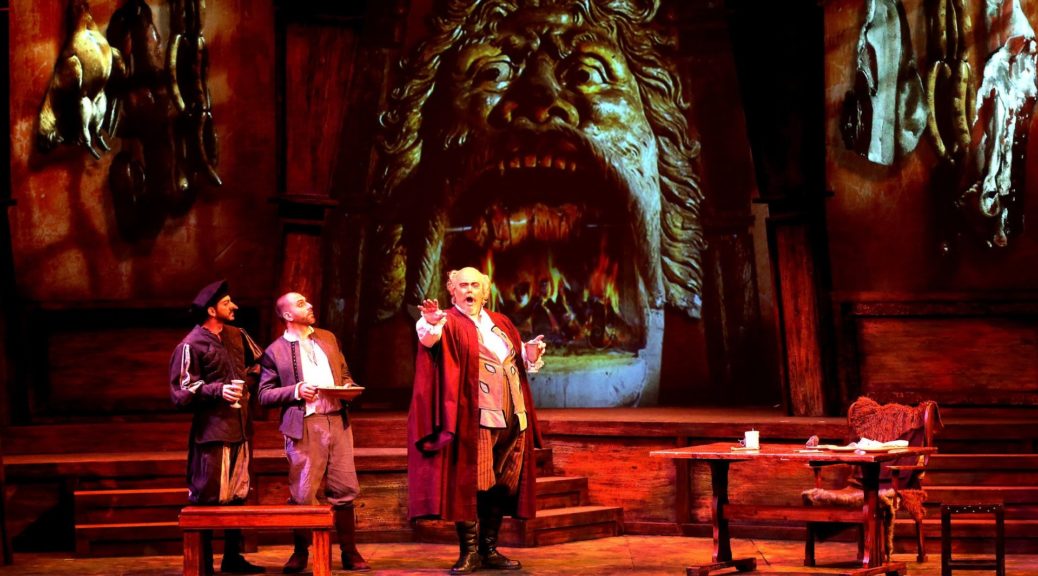
Troupe Making Silk Purse from Sow’s Ear
The miracle of West Bay Opera is not just that they pulled off yet another highly professional show in Verdi’s “Falstaff;” it’s what they do bringing that tiny community theater never built for opera so vibrantly to life.
Consider that you have no overhead space for flying scenery, no prompter’s box, very limited stage depth, a pit that can’t even seat half a Verdi orchestra, and space even tighter than Falstaff’s drinking buddies usually are. The conditions would be enough to drive Verdi himself to drink right alongside them.
So with brass and timpani stacked one atop the other in the wings with elaborate closed-circuit TV from the podium and stunning high-tech video projections for scenery, somehow it works. At least, as long as the old fat knight Falstaff exhales mightily whenever squeezing off into the wings—as precarious a maneuver as, say, docking some trans-Atlantic dirigible just landed into your garage.
With WBO’s two-year Verdi festival in midstream, “Falstaff” brought out not only the new technology scenery but also the sharpest stage direction I’ve seen all season, via Ragnar Conde, a Mexican who has worked in six countries. He gave the merry wives of Windsor who dupe the lecherous old knight the meticulous detail in gesture and face that you’d give a Shakespeare play. And the title character, baritone Richard Zeller, is no buffoon—even after being victimized and thrown into the river to “avoid an outraged husband,” he regains a measure of dignity while dispensing forgiveness in his parting “All life is a jest!”
Casting and handling a well-balanced pro cast of 10 plus chorus is no mean feat. Impressive in the female lead was soprano Taylor Haines (Alice Ford), a tall woman with stage presence who could project well, even in a larger hall. And as the husband Ford around whom Falstaff maneuvers, we had the resonant baritone Krassen Karagiosov, best in his act-two aria of high agitation. He is fondly remembered for having provided the emergency voice (only) in the previous Verdi, “I Due Foscari,” when the lead baritone had been abruptly silenced by laryngitis. The show must go on!
Credit to the orchestra, pulling it together even though stationed nearly off in the parking lot. And of course to WBO General Director, José Luis Moscovich, the engineer of the marvelous resurgence of this 63-year troupe, who conducted with smart pacing.
As for the novel backdrop projections, under Peter Crompton’s direction: What appear to be static backgrounds intermittently move and spring to life, whether a Falstaff portrait suddenly gesticulating or topiary popping up out of nowhere.
THE AFTERTHOUGHT OF THE MOST AMAZING RETIREE OF ALL TIME—Verdi had decided to take to the rocking chair after “Otello.” But, just for his private enjoyment of Shakespeare, he wrote the “Falstaff” manuscript, never expecting it to be produced. Or so he claimed. But this latest and perhaps greatest of his many works came off his shelf and was premiered in 1893, the same year he turned 80. And just for a little challenge, he wrote an awe-inspiring fugue to be sung by the 10 soloists at the final curtain, requiring a diction as exacting as a Gilbert and Sullivan patter song.
TWO-YEAR VERDI FOCUS—Next season, three more Verdi operas will be featured.
Verdi’s opera “Falstaff,” in Italian with supertitles, closing out June 2 at the Lucie Stern Theatre, Palo Alto. West Bay Opera’s 63rdseason finale; three hours. For WBO info: (650) 424-9999 or go online.